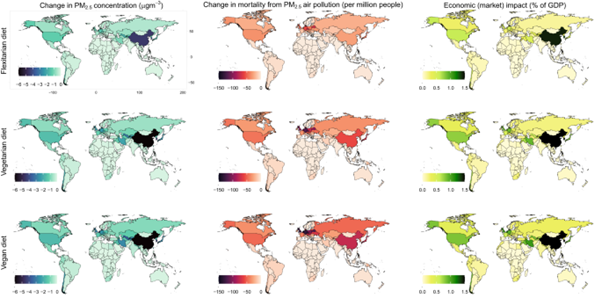The benefits of moving to a more plant-based diet are becoming increasingly important with impacts on personal health, societal health and the economy.
Dr Springmann, Senior Researcher and Environment and Health programme lead at the Environmental Change Institute (ECI) at the University of Oxford, is co-author of the paper 'The global and regional air quality impacts of dietary change' in Nature.
Dr Springmann said: “Air pollution increases cardiovascular and respiratory-disease risk, and reduces cognitive and physical performance. Food production, especially of animal products, is a major source of methane and ammonia emissions which contribute to air pollution through the formation of particulate matter and ground-level ozone.”
The scientists used a multi-model approach that consisted of agriculture, emissions, air quality, health, and economic analyses to estimate the air pollution-related health and economic impacts associated with dietary changes.

Global air quality impacts of dietary change

Regional air quality impacts of dietary change
Through their research they estimated reductions in premature mortality of 3-6% globally, including 9-21% in Europe, 12-18% in North America, and 4-10% in Eastern Asia.
Dr Springmann added: “Encouraging more people towards more plant-based diets is a valuable tool for reducing ambient air pollution and the associated health and economic impacts, especially in regions with intensive agriculture and high population density.”
- See the full paper: The global and regional air quality impacts of dietary change

